|
|
|
Sort Order |
|
|
|
Items / Page
|
|
|
|
|
|
|
| Srl | Item |
| 1 |
ID:
130241
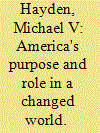

|
|
|
|
|
| Publication |
2014.
|
| Summary/Abstract |
I had never been a big fan of American exceptionalism. It was too self-referential, self-identifying, self-focused for my personal comfort. Then one bitterly cold day in February 1994, I was wandering through the open-air market in Sarajevo. The market had been hit by a single mortar round the previous weekend and sixty-eight people had been killed. Holes made by fragments from the 120-mm shell were still visible in the asphalt.
As I stared at the gouged surface in my battle dress and parka, Sarajevans began to come up to me, point to the small American flag on my upper sleeve, give a hesitant thumbs-up gesture, and whisper, almost prayerfully, "USA, USA."
Edward Snowden's leaks have fixated the media and the public on privacy and espionage, but the larger and more complex debate on protecting American security in the 21st century has been wanting.
At that point it became clear to me that it mattered less whether I thought America was exceptional. What mattered was that many people around the world thought that we were, and expected us to act accordingly. In many ways this is less something we have earned or even want, and more the product of historical circumstance. But a burden has clearly been ours, and when it is no longer ours the best judgment we can hope for is something along the lines of "As global hegemons go, these guys weren't bad." Now, under President Obama, the United States is involved in a redefinition or at least a recalibration of that exceptional role.
|
|
|
|
|
|
|
|
|
|
|
|
|
|
|
|
| 2 |
ID:
087248
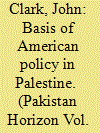

|
|
|
|
|
| Publication |
2009.
|
| Summary/Abstract |
In the first place, I wish to lay before you my own personal belief. I believe that in Palestine or in Kashmir or in Hyderabad or in any other disputed area, there should be but one principle upon which the United Nations decides national ownership. They should not consider the welfare of the surrounding states even when that happens to have relevance.
|
|
|
|
|
|
|
|
|
|
|
|
|
|
|
|
| 3 |
ID:
133852
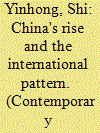

|
|
|
|
|
| Publication |
2014.
|
| Summary/Abstract |
Three basic elements stand out in the international pattern: global power distribution, the system of international norms and the transnational values systems, all of which are of vital importance in the interaction between China's rise and the future international pattern.
|
|
|
|
|
|
|
|
|
|
|
|
|
|
|
|
| 4 |
ID:
130472


|
|
|
|
|
| Publication |
2014.
|
| Summary/Abstract |
The United States is in the early stages of a substantial national project: reorienting its foreign policy to commit greater attention and resources to the Asia-Pacific region. This reformulation of U.S. priorities has emerged during a period of much-needed strategic reassessment, after more than a decade of intense engagement with South Asia and the Middle East. It is premised on the idea that the history of the twenty-first century will be written largely in the Asia-Pacific, a region that welcomes U.S. leadership and rewards U.S. engagement with a positive return on political, economic, and military investments.
As a result, the Obama administration is orchestrating a comprehensive set of diplomatic, economic, and security initiatives now known as the "pivot," or "rebalancing," to Asia. The policy builds on more than a century of U.S. involvement in the region, including important steps taken by the Clinton and George W. Bush administrations; as President Barack Obama has rightly noted, the United States is in reality and rhetoric already a "Pacific power." But the rebalancing does represent a significant elevation of Asia's place in U.S. foreign policy.
Questions about the purpose and scope of the new approach emerged as soon as Secretary of State Hillary Clinton offered what remains the clearest articulation of the strategy, and first used the term "pivot" to describe it, in a 2011 article in Foreign Policy. Almost three years later, the Obama administration still confronts the persistent challenge of explaining the concept and delivering on its promise. But despite the intense scrutiny and short-term setbacks faced by the policy, there is little doubt that a major shift is well under way. And whether Washington wants it to or not, Asia will command more attention and resources from the United States, thanks to the region's growing prosperity and influence -- and the enormous challenges the region poses. The question, then, is not whether the United States will focus more on Asia but whether it can do so with the necessary resolve, resources, and wisdom.
|
|
|
|
|
|
|
|
|
|
|
|
|
|
|
|
| 5 |
ID:
132814
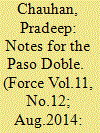

|
|
|
|
|
| Publication |
2014.
|
| Summary/Abstract |
In the run-up to the forthcoming historic visit of Prime Minister Narendra Modi to the US in September, it seems particularly pertinent for this edition of 'Maritime Meanders' to amble through some of the past and present (and even discern some element of the future) of the maritime component of the India-US defence relationship.
|
|
|
|
|
|
|
|
|
|
|
|
|
|
|
|
| 6 |
ID:
131453
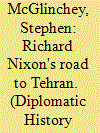

|
|
|
|
|
| Publication |
2013.
|
| Summary/Abstract |
By the time of Richard Nixon's arrival in office Iran had already become America's single largest arms purchaser. This was the result of an evolutionary process that had been underway for two decades. Nixon did not just change that evolutionary pattern of arms sales with Iran, he completely revised U.S. thinking on Iran's regional role. By the end of his first term in office, Nixon had leveraged U.S. Middle Eastern regional policy primarily around the focal point of a militarily strong, pro-U.S. Iran. In concert, the shah was encouraged to begin an unprecedented military spending spree. Consequently, in mid-1972 following a meeting of the two leaders in Tehran, Iranian annual purchases went, virtually overnight, from being measured in the tens of millions to being measured in the multi-billions. Tracing the complex evolution toward that meeting, and the accompanying policy shifts, form an underappreciated part of Cold War history.
|
|
|
|
|
|
|
|
|
|
|
|
|
|
|
|
| 7 |
ID:
103087
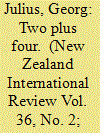

|
|
|
|
|
|
|
|